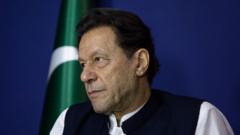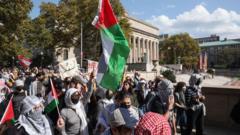In a significant turn of events, Imran Khan, the former Prime Minister of Pakistan, has been sentenced to 14 years in prison following a controversial corruption case that critics claim is politically motivated. This ruling represents the longest prison term imposed on Khan, who has faced over 100 charges since his detention in August 2023, including serious accusations ranging from leaking state secrets to personal gain from state gifts.
Imran Khan Sentenced to 14 Years Amid Corruption Allegations

Imran Khan Sentenced to 14 Years Amid Corruption Allegations
Former Prime Minister Imran Khan receives maximum prison sentence as multiple political charges challenge his leadership.
The latest charges allege that Khan and his wife, Bushra Bibi, accepted a parcel of land as a bribe linked to the Al-Qadir Trust, an organization created during his tenure. In return, Khan purportedly facilitated the payment of court fines owed by a real estate mogul using repatriated funds from the UK's National Crime Agency. However, Khan's party, Pakistan Tehreek-e-Insaf (PTI), maintains the land was meant for a charitable purpose and not for personal benefit.
Despite the conviction, Khan reaffirmed his resolve, stating he would not seek leniency or an agreement with authorities. He has been penalized with a fine exceeding £4,000, while Bibi, also found guilty, has been sentenced to seven years and fined over £2,000.
This sentence amplifies the already contentious atmosphere in Pakistan's political arena, where Khan continues to exert influence despite his incarceration. His supporters have been vocal, staging widespread protests against his arrest, resulting in crackdowns by law enforcement that led to many arrests and injuries among demonstrators. Even with his freedom restricted, Khan's enduring popularity was evident in the previous election, where his party secured a majority of the seats.
Khan's saga raises questions about the political landscape in Pakistan and the implications of his legal battles on democracy and governance in the country.
Despite the conviction, Khan reaffirmed his resolve, stating he would not seek leniency or an agreement with authorities. He has been penalized with a fine exceeding £4,000, while Bibi, also found guilty, has been sentenced to seven years and fined over £2,000.
This sentence amplifies the already contentious atmosphere in Pakistan's political arena, where Khan continues to exert influence despite his incarceration. His supporters have been vocal, staging widespread protests against his arrest, resulting in crackdowns by law enforcement that led to many arrests and injuries among demonstrators. Even with his freedom restricted, Khan's enduring popularity was evident in the previous election, where his party secured a majority of the seats.
Khan's saga raises questions about the political landscape in Pakistan and the implications of his legal battles on democracy and governance in the country.


















